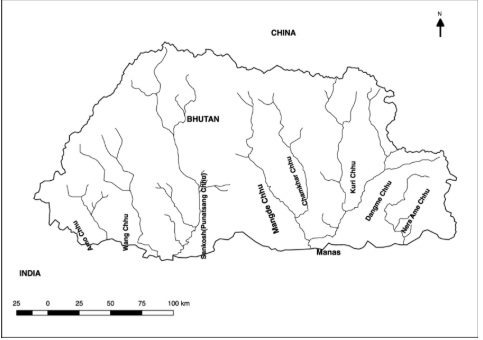(Preliminary Exam: Current Affairs)
(Main Exam, General Studies Paper- 2: India and its Neighbourhood- Relations) |
Reference
West Bengal Chief Minister Mamata Banerjee has raised the demand that Indo-Bhutan River Commission be formed and West Bengal be made a member of it. This demand is important because the water of rivers coming from Bhutan is a major cause of floods in North Bengal.

Demand for Indo-Bhutan River Commission
- Many rivers including Bhutan's Sankosh River (other name- Gadadhar) enter North Bengal. Districts like Jalpaiguri and Alipurduar of West Bengal are highly affected due to the rising water level of these rivers every year.
- Major rivers originating from Bhutan and flowing into India are mainly in the Brahmaputra basin, including the Sankosh (Puna Tsang Chu), Raidak (Wang Chu), Manas, Mo Chu, Jaldhaka and Drangme Chu river systems.
- The Chief Minister of West Bengal says that the problem is not being solved by technical committees alone and a joint river commission is necessary for a permanent solution.
- West Bengal should be made a member of this commission so that the real situation and needs of the state can reach the commission directly.
Constitutional provisions
- Articles 246 and 262: Under these, Parliament has the right to make laws on disputes related to interstate and international rivers.
- The central government can negotiate international river agreements and decide to give representation to the states.
- Currently, Joint Expert Group (JGE), Joint Technical Team (JTT) and Joint Expert Team (JET) are working between India and Bhutan which discuss flood management and forecasting.
Need
- Floods in North Bengal cause loss of life and property every year.
- Lack of proper management of water coming from Bhutan's rivers causes huge damage to agriculture.
- The state says that only expert committees cannot solve the problem but it is also necessary to include local needs and experience.
- The formation of this commission will increase the state's participation in water management and will lead to more effective planning.
Impact
- Positive impact:
- Better flood control measures will be implemented.
- Farmers and local people will get relief.
- India-Bhutan relations will become stronger.
- Negative impact (if not formed):
- The problem of repeated floods every year will persist.
- Disputes between the state and the centre may increase.
- Economic and social losses will continue.
Challenges
- Legal and diplomatic approval of the Indo-Bhutan agreement
- Lack of financial resources and disputes over fund allocation between states
- Commission takes time to form and does not provide immediate relief
Way forward
- The central government should initiate discussions on a permanent river commission by including representatives from affected states like West Bengal and Assam.
- There should be a long-term agreement with Bhutan on water management and flood control.
- Practical solutions should be prepared by bringing local administration, scientific experts and technical teams on a common platform.




